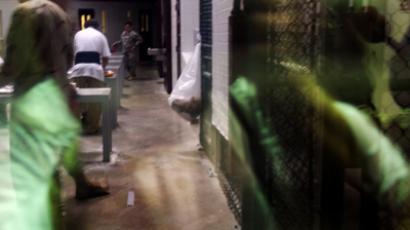Guantanamo death: 'We may never know how the person died'
It’s not uncommon for inmates to be tortured and die in suspicious circumstances in Guantanamo, journalist Ryan Dawson told RT.
He adds that the coming handover of the Bagram prison to the Afghans is just a “handover on paper” and that the US will retain control of the fate of the prisoners.A prisoner who had been in solitary confinement in Guantanamo was declared dead by guards on Tuesday, while an investigation into the cause of death has been launched. Ryan Dawson, a co-author of Why Peace and a contributor to whatreallyhappened.com, explained to RT that the truth about what goes on in Guantanamo may never be known. RT: Now the cause of death hasn’t been established, but for many people, when they think of Guantanamo, they think of torture. Could there have been foul play involved, do you think? Ryan Dawson: Possibly. Earlier, in 2006, we had three possible suicides where people had rags stuffed in their mouths and also were hanged, which is a little suspicious – to suffocate yourself with a rag and also hang yourself. We know one of the methods of torture is dry boarding, where rags are stuffed in prisoners’ mouths and they are taped. Whether this person died of suicide or not, we’re not going to know because he’s categorized as an enemy combatant, which is essentially a human being without rights. And as an American I’m completely ashamed of that, because it’s completely unconstitutional. RT: Essentially this detainee had not been charged with anything, and he wasn’t going to be prosecuted. What was he still doing in Guantanamo? RD: Well actually that’s a typical case; it’s not unusual for people to be there for years without being charged. Again as an enemy combatant, it’s going to be very hard to get to the bottom of it. As to why he wasn’t released, when he hadn’t been charged with anything, we may never know. He may have been a victim of torture, he may have witnessed torture or any number of things the US wouldn’t want to get out, but it’s going to be hard to get that information. RT: Now the US says it can’t release many of the prisoners who aren’t being charged because it can’t find any stable country to accept them – what exactly does that mean? Can that be a valid reason to keep people there? RD: I think that’s just an excuse to keep people there. They’ve released people back to Yemen, which is in the middle of a civil war – you could hardly call that stable – and they’ve died there. So I don’t really think that’s an honest pretext to hold prisoners there at all. I think they have more sinister reasons. RT: Do you think then its Obama’s fault that Guantanamo is still open, If allied countries refuse to accept prisoners – some of which are their own nationals – from the facility? RD: It’s not completely Obama’s fault, but he did run on a campaign of closing Guantanamo Bay, and didn’t even attempt to do it. And I know some Democrats would like to fault the Republicans for that and say that’s the Congress's fault, but he didn’t even attempt to close Guantanamo. It’s one thing to get overruled by the other party or another branch of government; it’s another thing to not even bother with it. He simply lied because that was something politically feasible at the time; it helped him get elected. As for allies not accepting these detainees, again I’m not buying that as the real excuse, as they have released these prisoners before who have died in the middle of a civil war. RT: Mr. Dawson, I want to talk just a little bit about Bagram prison, sometimes also dubbed the Guantanamo of Afghanistan, and it has been handed over now to Afghan forces – what do you make of that? RD: I think that’s a bit like rearranging the chairs on the deck of the Titanic. If you remember last year in Kandahar, there was a prison break-in where the Taliban successfully dug a tunnel into the prison and released over 500 Taliban fighters, and that was largely blamed on the lackadaisical Afghan guards. Now they want to hand over to the Afghans another prison, but it’s not really a true handover because the US is keeping a check on that. They are not going to allow the Afghans to release any prisoners the US doesn’t want released. So it’s only a handover on paper. RT: That was going to be my next question, because America refuses to hand over Bagram inmates that would be released by the Afghans, as they aren’t really charged with anything. Isn’t that really Guantanamo but worse, as they actually have somewhere to go? RD: Slightly worse, I guess you could say, because they could definitely be reabsorbed into another country where they were captured. In Guantanamo too, a lot of the people who were there are Taliban fighters who were fighting the Northern Alliance before 9/11. They are prisoners of war, but they are not categorized as such so they don’t enjoy any rights as POW’s.














